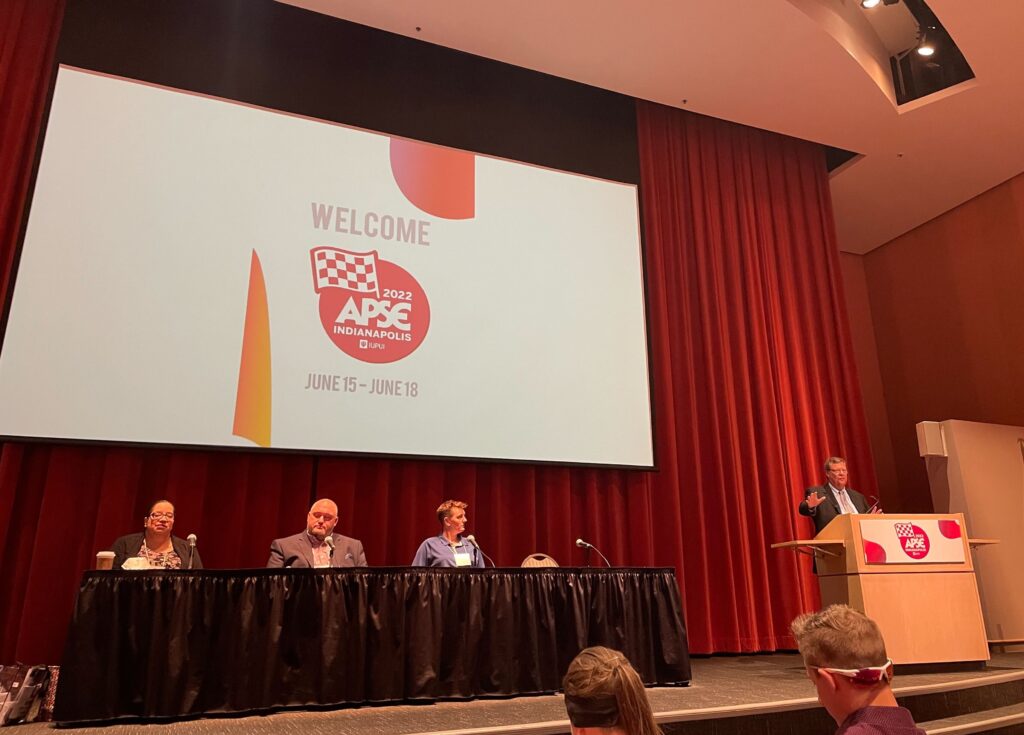By Bryan Carter
Sports Capital Journalism Program, IUPUI
At the APSE Summer Conference last August, members were still managing their way through the implications of Covid-19 and the widespread changes it brought to the world of sports media. The general session “The New Normal” on Thursday took account of many of today’s practices, both positive and negative, that are here to stay and how things may look moving forward. Moderator Jorge Rojas of The Athletic was joined by panelists Emily Horos, deputy sports director of the Arizona Republic; Jim Pignatiello, sports director of MassLive; and Iliana Limon Romero, the Los Angeles Times assistant managing editor for sports.
Most all of sports media was forced to work remotely when sports resumed as the pandemic began to subside. Zoom meeting issues, work/life balance and mental health problems were among the topics discussed that continue to impact the world of sports writing.
It was evident that most in attendance consider the advancements in technology both a blessing and a curse. “We seemed to have added more ways to get in touch with one another over the past few years,” said Pignatiello. “This idea that we have to be available and on top of our text messages, our email, Slack, our teams. My suggestion is for everyone to think about group norms and have a discussion about what is the expectation for how we are going to get in touch. The more time we can whittle that down, the less time we’re wasting. One of my challenges is to clear up some of that clutter so we can actually do our work.”
Zoom distractions and overload seemed to strike a chord with most attendees. Speaking to an audience with computer cameras turned off, barking dogs, delayed response and simple Zoom fatigue were all mentioned. Limon Romero acknowledged that meeting frequency was weighing on her staff and she decided to take action.

“We started an initiative in January that has been really popular and successful where we have ‘Meeting Free Wednesday,’” she said. “It’s like a holiday and it has allowed us to do a lot more one-on-one conversations with staff, to do planning for projects, to do other things and just largely not be consumed. It also lets us focus in more on the Zooms we have on those other days, so I think that’s helpful.”
Not all of the changes brought about in “The New Normal” have been negative. Some have been welcomed and some of the panelists hope they are here to stay.
“I don’t miss commuting an hour, wearing a shirt and tie, the gas, dry cleaning, the six meetings a day,” Rojas said.
Limon Romero pointed out that in Los Angeles, “We were talking commutes more than an hour each way that are no longer there so it gives people a ton more time to talk planning, to talk to reporters or however they choose to utilize that time.”
For Horos, change has been beneficial on a more personal level. “For me it has been a definite win,” she said. “I’ve got two special needs kids. I would’ve taken a medical leave or quit my job. They go to 12 appointments a week so I work my day around it. My kids are adopted, 18 months old, and that decision wouldn’t have come if I didn’t know I had that flexibility and I could be in that position.”
As people have had to grapple with the various issues brought on by the pandemic, mental health has been widely affected. This topic brought about the most audience interaction with the panelists as they were asked how much the mental health of their co-workers has been brought up in their workplaces.
“I try to have calls, particularly with those who look stressed that don’t involve an assignment to ask ‘How are you doing?’” said Limon Romero. “It is a really powerful thing and I’ve had several people tell me they were overwhelmed by just someone asking them that question with no expectation in return.”
Pignatiello pointed out that giving time off leads to more productivity when people are working. Horos noted that, “You need to make sure they are taking time off. Sometime you don’t realize you have to step back until you have to step back. The best way to get trust is to give some trust.”
When asked to look into their crystal ball and predict the future of the industry, the panel seemed convinced that the past is the past and we will not be going back to how things were before.
“We just have to be good with who we are and what we value and not really worry about what normal looks like,” Limon Romero said. “That could be scary or that could mean an exciting opportunity.”
“It’s kind of like life post-9/11,” Horos added. “We don’t see loved ones off at the airport gates anymore and we carry clear bags into the stadiums. It’s just different and it is not going to go back.”





